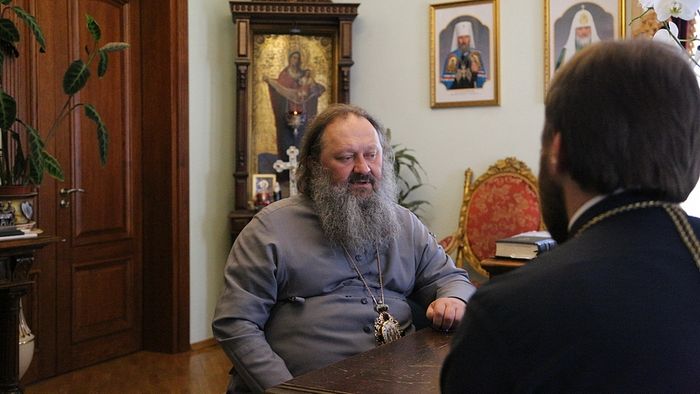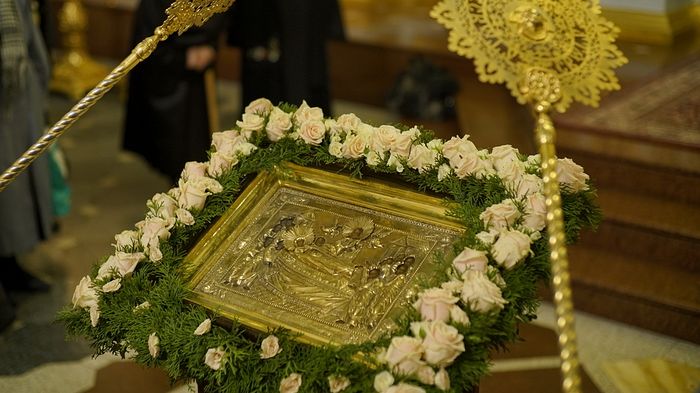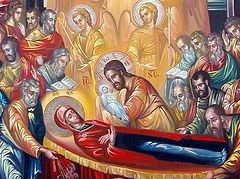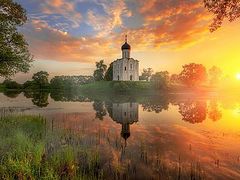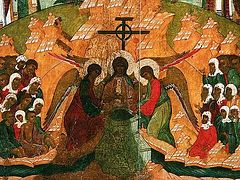In this interview, His Eminence Metropolitan Pavel of Vyshgorod, the abbot of the Holy Dormition Kiev Caves Lavra, speaks about how we should spend the Dormition Fast, how we should approach Holy Communion, and about the significance of the feasts that fall during the Fast.
—Your Eminence, thank you for this meeting. The main theme of our conversation will be the Dormition Fast. Vladyka, could you tell us about the origins of this fast and its significance for the life of a Christian?
—The Dormition Fast has been known since the first centuries of Christianity; it is a fast of sorrow and grief. When the Mother of God was with the disciples after the Resurrection of Christ, they rejoiced at the constant blessing, communication, and direction she gave, and, as the holy Patriarch Tarasios and other holy hierarchs write, they all desired to see the face of the Mother of God, because such grace and power came from her that you could truly feel it, and it would be light and pleasant for your soul.
In the words of Christ the Savior, when the Bridegroom is taken away, then begins fasting, abstinence, and various types of grief and feelings. This is how it happened with the Mother of God. The Archangel Gabriel brought her tidings of her transfer to the mansions in the Kingdom, to her Son in Paradise. And the Mother of God prepared for this event. Although she knew everything, still, the Holy Fathers say, as a human she was worried and agitated in her soul.
And when the Lord wanted to take His mother’s soul into His hands, there was a noise outside (the apostles had arrived before it), and she passed into the hands of her Son and God.
Of course, the joy of the Mother is sorrow for the people, because the apostles and all those who were living in Jerusalem at the time were left without their intercessor before the Son. Many lost their benefactor, but in having passed to the life beyond the grave, she remains among us and with us.
Therefore, the fast took its beginning after the Dormition of the Most Holy Theotokos. We experience this great tragedy, but we know that, “In giving birth thou didst preserve thy virginity, in falling asleep thou didst not forsake the world, O Theotokos. Thou wast translated to life, O Mother of Life, and by thy prayers thou dost deliver our souls from death” (Troparion of the feast of the Dormition of the Most Holy Theotokos).
This fast is both sad and joyous, because we have received both joy and comfort. Another great feast falls during this fast—the Transfiguration.
The Transfiguration of our Lord and Savior Jesus Christ took place before His suffering, as the Gospel testifies. Moses and Elias appeared to the Lord, one from among the prophets who had died, the second from among the living. According to prophecy, Elias will come again before the Second Coming of the Savior to preach; he will be killed, and he will be numbered among the martyrs.
Therefore, the Church does not celebrate this joyous feast of the Transfiguration during Great Lent, so as not to interrupt the fast of Holy Week, but this feast is celebrated during the Dormition Fast. In being transfigured on Mt. Tabor, the Lord showed all of mankind that man will be transfigured and that it will be the Light of Christ that transfigures him.
Being transfigured, the Orthodox faithful receive Divine grace in prayer and fasting. Therefore, the Dormition Fast, as I have already said, is both sad and joyous at the same time: sad because we are parting with the Mother of God, but joyous because we are gaining an intercessor, a patron, the co-ruler of Heaven and Earth with her Divine Son, and for us—a joy and comfort.
—Vladyka, what symbolic significance is there to bringing the Cross out from the altar to the center of the church on the eve of the Dormition Fast?
—Christ saves every man, and through the Cross we have been adopted by God the Father and have received forgiveness of our sins.
The history of this feast takes us to the ninth century in the East, to Constantinople. At that time, in the summertime, the people especially suffered from epidemics, from fatal diseases in August. But no one can help a man if the Lord does not help him. Therefore, the Patriarch together with the clergy would take icons, the cincture of the Mother of God, and the Lifegiving Cross, carry them along the streets of the city, stopping at intersections, where they erected newly-constructed crosses, and the Cross with a piece of the Tree of the Lord was placed in the middle of Agia Sophia, and the people would come, venerate it, and receive joy and comfort. Thus the Lord stopped all disasters by the prayers of the entire Church, still waging war on Earth. Sicknesses and epidemics ceased. Thus, the bearing forth of the Honorable Wood of the Lifegiving Cross became a good tradition of our holy, universal Orthodox Church.
Therefore, today we also bring out this Cross that gives a man strength, that gives a man the desire to bear his own cross in life and to reach the quiet harbor of the Heavenly Kingdom.
—The two weeks of the Dormition Fast is a short time, but a time that is very beneficial for the soul of every Christian; a time when we pause, take a rest, and take care of the spiritual. But how should people who are sick, who are experiencing some kind of mental or physical diseases, fast? How should they spend these days of the Dormition Fast?
—I would like to note for our dear readers that the materials on our site are aimed not at satisfying any ambitions of man, but at the salvation of the soul, at life according to the Gospel, to discovering the truths of the Gospel in the life of man, of every one of us.
And the person who is truly sick, as you say, tries all the more to fast, because he knows that fasting is one of the two wings of salvation—fasting and prayer—that help a man be healed. It is precisely thanks to fasting that many healings occur. Many believers, especially the elderly—my age and older (I see it from my own mother and other women of my native village)—fast without any relaxation. They fall, they even lose conscience, but for them to break the fast is tantamount to treason; it would be better to accept some kind of torture and suffering.
Therefore, whoever can fast should fast; fasting will bring healing of the flesh to such a person. Of course, there are exceptions. For pregnant women and breastfeeding mothers there is the Church’s concept of economia; that is, they are given an indulgence. But you can approach it selectively: For instance, eat fish but not meat and milk. Today there are enough vitamins to give us strength; but fasting cannot be only with one wing.
A bird with a severed wing cannot fly upwards. It is impossible to speak of truly observing the fast by just abstaining from animal products but not praying. Prayer has no boundaries, no limits; there is neither time nor timelessness; we should pray without ceasing.
Without ceasing—in bed, sitting, lying down, on the road. The Lord gives us the chance to always say the sweetest prayer: “Lord, have mercy!” You can read prayers, psalms, those learned by heart, or the Jesus Prayer. This will inspire you.
Of course, there are times when there can be a blessing to relax your fasting due to health conditions; for example, for a sick person either before or after an operation. I had this experience two years ago; the Lord gave me this trial during Great Lent. I want to say that during a sickness, you don’t want to eat. But if the doctor tells you to eat in order to gain the strength your body needs to fight the illness, you have to follow the recommendations of your doctor.
Therefore, if you have the strength to fast, don’t get your priest to bless an indulgence. A priest won’t allow you to relax the fast without a good reason. Christ Himself said: This kind goeth not out but by prayer and fasting. (Mt. 17:21).
If you don’t have the strength to fast, you can go to confession and tell the priest: “Batiushka, forgive me, I am unable to keep such a fast, because of such and such a reason,” and the priest will pray and bless you. You absolutely have to go talk to your priest. But those who can fast should not worry about the fast harming their health. No one has ever died from fasting.
And today, of course, it’s a shame that especially the youth, and elderly people too, try to preserve their physical beauty. They burden themselves with the thoughts: “The doctor said, the fortune-teller said, the clairvoyant said that I either can or cannot eat something.”
Eat everything when you can. Only don’t eat people and don’t drink human blood. But when we have the fast on Wednesdays and Fridays, on special Church days, if you hope in God’s help, the Lord will help you. It’s the fashionable diets that hurt us nowadays; they have brought many people to their graves.
And another problem—today, there are many who cannot conceive children; I’ve had to learn some medical terms and turn to doctors for advice, because many women come and complain: “I want to be a mother, but I can’t conceive, I can’t bear a child.”
Of course, if you have sinned a lot, or if you are withered from some diet, your body can’t provide the necessary nutrients for the child, for conception, to bear him to term in the womb, then how can we talk about giving birth? Without prayer, it’s not a fast.
We have to always understand that we need moderation in all things. The Church established all the fasts not for man’s deprivation, but exactly the opposite—for his health. And we have to understand that we need strength to bear our crosses in life, to fight with the passions and vices, to bear our cross to the quiet harbor of the Heavenly Kingdom.
—Vladyka, we often hear questions about how often to confess and commune, and this is especially relevant during the Church fasts.
—I’m not a proponent of frequent communion—of communing every day.
The holy Apostle Paul says that when people commune without worthy reverence and fear, many become sick and die. That means, we must understand that we are not eating bread and not drinking wine; we are eating the Body and drinking the Blood of Christ the Savior.
When someone communes every day, he loses the meaning of this Communion. He slips into a commonplace understanding, into habit. Remember when you communed for the first time; remember when you read the Gospel for the first time; remember when grace touched your soul during prayer. It’s sad when people commune carelessly. I see it even in the Lavra. You have to read the necessary prayers before Communion, but with understanding, piety, and spiritual awe, not on “auto drive.”
The person who wants to commune should observe his own soul, reevaluate his life, and he should fast for three days,1 and if more—it’s not a sin. He should reconcile with everyone—in his family in particular; and with friends—we should not have any enemies.
He should be at the evening service; he should arrive before the beginning of the service to write commemoration lists, hand them in, and light candles. He should go to confession, and concentrate. And you have to tell God what you think are your sins. The priest receives your confession, but it is the Lord Himself Who hears, receives your repentance, and forgives.
Sometimes people say in confession that they haven’t sinned at all. This is a delusion. We can start with the fact that many don’t make the Sign of the Cross correctly. Of course, there are situations where people cannot reach their forehead due to an injury, their hands do not bend—that is one question. But if you wave your hand like you’re swatting flies away, that is a great sin, and the prayers of a sinner are not heard by God. They give a person over to the judgment and to condemnation.
I always advise my spiritual children to commune every third Sunday, or any day during the week.2 And during the period of Great Lent, you should commune on Annunciation, on Lazarus Saturday, and definitely on Holy Thursday, even if you communed a few days before on Palm Sunday, because it is a great, memorable, historic day—when the first Eucharist was celebrated by the Lord Himself.
After the Mystical Supper, the Lord celebrates the Eucharist, but through a priest, through every one of us. But the Lord Himself celebrated the first Eucharist on Holy Thursday before His suffering.
You should commune during all four Church fasts, and on your birthday, and on your name day.3 You can commune on memorial days as well—if your parents have reposed, then on the day of the death of your father and mother. Order a panikhida, remember their good lives, thank them for their dedication; they dedicated their lives to us, their children. It would be good to commune on this day.
I repeat: I’m not a supporter of communing every day or every Sunday. Don’t lose your fear of God.
Many give the example of the Righteous John of Kronstadt. But he was a great ascetic. Are we worthy of this? St. Mary of Egypt communed once in fifty-three years, and was accounted worthy of the Heavenly Kingdom. I’m not calling us to that; I’m not saying you should commune one single first and last time. I insist that we must prepare ourselves for the Mysteries. Remember that when St. Mary of Egypt asked St. Zosima to come a year later with the Mysteries of Christ, she waited with such reverence. She worked a miracle, made the cross over the Jordan, and walked on it as on dry land.
Can you do that? If we offend our neighbor, our husband, wife, brother, or sister, how can we approach the chalice, to the Fire that sears all ungodliness?
It would be good, in the Dormition Fast, to commune first on Transfiguration, and on Dormition, if you can; but not every day; I don’t recommend it. It won’t bring you joy.
—Vladyka, you mentioned St. Mary of Egypt, who communed only once in her life.4 And now many of our people live abroad for various reasons, where there aren’t always Orthodox churches. What should such people do?
—Today it’s difficult to find a city without an Orthodox church. There are parishes of the Antiochian Church, the Alexandrian Church, of Jerusalem, Constantinople, Serbia, Bulgaria; our Russian Orthodox Church is opening churches. There is the American Church. If someone finds work 6,000 miles from home, if he finds the conditions necessary for this temporal life, then he can find a church and go there to pray and commune of the Mysteries of Christ at least two or three times a year. The Lord will help, if you want it.
If you are hindered by reluctance, the habit of putting things off “until alter,” then that is another question. Many people find time and the opportunity for entertainment. Note that today not only men, but women also go to the beer festivals, to other cities and countries for soccer matches, to figure skating competitions—where don’t people go these days?... But we have no time for church. We have no time for the services; we have no time or strength to prepare for Communion.
I am surprised by many things in modern life. We rush to go to Mt. Athos once a year, but we don’t know our own native churches. How we admire Greek priests! But we don’t know our local batiushka.
—Vladyka, to conclude our conversation: This fast prepares us for our patronal feast, for the feast of the Dormition. What would you like to wish our brethren, as well as our entire flock in this fast?
—First of all, I would like to entreat our brethren to treasure this short time of our earthly lives, to not be lazy in going to the churches of God, to go to all the services of the entire daily cycle, to try to live in love for one another, that the preaching of our entire lives would draw people to the source of life, to Christ; not by our works—we can do nothing—but by God’s grace.
I would like to appeal to those who will read this, to visit their churches. Our lives, dear brothers and sisters, are but a short time. Our lives are filled with sicknesses, sufferings, untruths, and sorrows, and therefore you will find only one truth—Christ. You will find one place—My house will be called a house of prayer…—and that means the churches.
If you love your church, the Church will love you. You will have the blessing of this holy place, where you will pray. People come to church and forget about everything earthly: There’s no enmity, no falsehoods, no deceit, or hypocrisy. It means God has gathered us. We feel grace and we abide in joy. If we gather in other places, at shows, where they insult one another, where they speak falsehood, all kinds of lies, and slander, it means it is a satanic gathering. Fear such gatherings, wherever they may be held: On television, in other public places, sectarian gatherings, because these are people who don’t desire salvation for you, and their houses are filled with lies.
Many love to mock the Church today. He who mocks the Church mocks himself and goes to destruction, because the Church is holy and there is no falsehood in it. It is a sin to mock those who desire the most important thing for everyone—the salvation of the soul, and that they would go to the Lord.
We must remember that we are not angels, but earthly people. Every priest has his children, his family, his concerns. I ask you all not to watch harmful satanic television shows, which lead to the destruction of humanity, condemning what is sacred, and sowing pernicious doubts in people’s souls.
It seems there is a plan at work today for the destruction of all that is holy, for the replacement of the holy with the sinful. Gay parades and such gatherings are being guarded by law enforcement officials. Tolerance allows sin; sin is given the green light everywhere. And Christians await every kind of oppression. But they will hate us “for His name,” and persecute Christians, because Christians are not of this world.
The Mother of God also endured persecution for the Lord’s name when she received news from the Archangel Gabriel of the conception of Jesus Christ. Her neighbors in Nazareth saw that the Virgin was with child. They began to malign Joseph and the Mother of God. No one knew the Mystery of the Incarnation of the Divine Son. And when they went to the Jerusalem Temple, the priest celebrated a specific rite. While prayers were being sung, the Lord would clearly show, would give a sign, if someone had sinned; there were special manifestations of obedience or resistance to the will of God. When a prayer was read over the Mother of God and Joseph, the High Priest saw nothing convicting them, but he saw an aureole of splendor over her and said: “Go and live. You have no sin.”
The Most Holy one endured all sorrows uncomplainingly. The Mother of God had to flee with the Babe to Egypt, to endure banishment from Herod, to endure slander from the high priests and scribes. Knowing that her Son, the Savior of the world, Christ, would come and transform our sinful habits, transform all of mankind, as we know from the Gospel, she had to endure all sorts of ridicule, to pity Him on Golgotha, to be there when they crucified Him on the Cross, and to see His glorious Resurrection.
In imitation of the Mother of God, Christians today should not hold grudges against anyone; they should understand that these people who malign others are themselves unhappy. They are poor people, victims of the devil, who have no peace of mind, and they live to bring all kinds of lies and slander upon someone.
We shouldn’t fear them, but we have to pray for them, that the Lord would save us and enlighten them. Therefore, let us pray to the Lord and the Mother of God with a pure and broken heart, with tears in our eyes, that she would not forget us, the wretched and unfortunate.
Let us be indulgent; let us remember that those sinful people were also born from mothers, but they were not instilled with love for God, for people. They need our prayers, and the Lord will give them joy and comfort in His mercy.
—Vladyka, thank you for your instructions.

